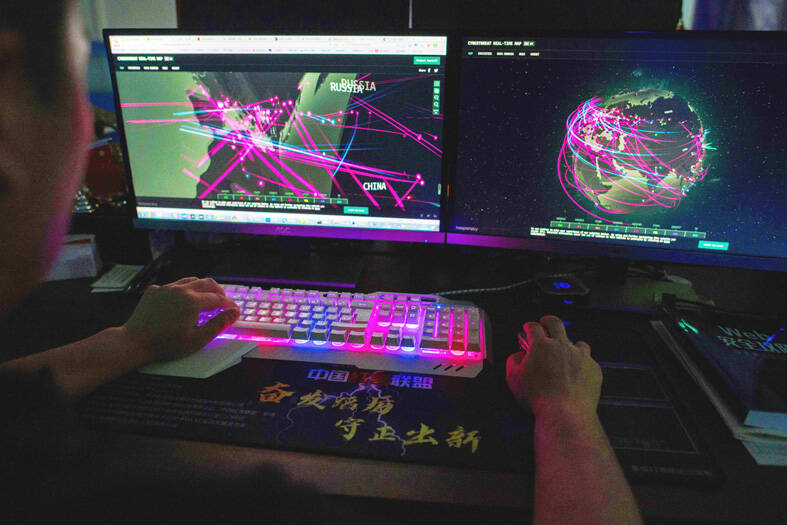The Administration for Cybersecurity would focus on bolstering cybersecurity for key infrastructure in its four-year policy direction plan to be decided next month, administration director Tsai Fu-long (蔡福隆) said.
President William Lai (賴清德) on March 13 introduced 17 major strategies to respond to five major national security and “united front” threats Taiwan faces. The five major security threats are: China’s threats to national sovereignty, espionage activities targeting the military, attempts at obscuring Taiwanese’s national identity, “united front” efforts to infiltrate society through cross-strait exchanges, and so-called “integrated development” aimed at attracting Taiwanese businesspeople and youth.
“One of the administration’s tasks is to conduct in-depth cybersecurity testing on key infrastructure, such as finance and healthcare, to prevent Chinese hackers from taking advantage of weaknesses to launch attacks,” Tsai said during an exclusive interview with the Liberty Times (sister paper of the Taipei Times) on March 27.

Photo: AFP
Denial-of-service attacks tend to attract great attention and are often used as a diversion, he said, adding that security experts are more concerned about those who invade and lurk in critical infrastructure.
“After sneaking in, they stay low to avoid being discovered and only launch attacks when necessary,” Tsai said.
Critical infrastructure refers to facilities related to the operation of the government and people’s livelihoods, including finance, transportation or medical care, he said.
“For example, if a bank is hacked, people may find themselves unable to withdraw money,” Tsai said. “If a hospital is hacked, it could delay medical care for those in a critical condition, and if a railway system is hacked, it could lead to train collisions.”
Therefore, in-depth inspections of critical infrastructure are crucial, so that those hiding within could be detected and removed before they cause harm, he said.
The information security of news organizations should also be bolstered to prevent hackers from attacking the media and spreading false information to affect the public’s morale during emergencies, he added.
Another focus would be to improve cybersecurity at listed companies, which would also spur demand for cybersecurity products and services, resulting in a positive cycle, he said.
“Some cybersecurity professionals have suggested that the government should take stock of the key technologies the country must master to ensure that Taiwan can be self-sufficient and not rely on foreign countries in the event of war or crisis,” Tsai said.
The administration would keep abreast of global trends in the cybersecurity industry through international research organizations, and use its findings to identify technologies that have fewer international suppliers, he said, adding that doing so could help Taiwan find its market niche and spur the development of that industry.
It would also encourage enterprises to invest more in information security, particularly focusing on Taiwan’s nearly 2,000 listed and over-the-counter companies, he said.
Cybersecurity would form an important component of supply chain management, Tsai said.
Taiwan Semiconductor Manufacturing Co has provided a good model for such measures, which has led to upstream and downstream industries strengthening their cybersecurity, he said.
Moving forward, the administration would work with associations to encourage more industry leaders to prioritize cybersecurity and jointly develop supply chain security standards, Tsai said.
In the second half of the year, the administration would launch a program aimed at identifying vulnerabilities in information and communications technology (ICT) products, he said, adding that it would call on manufacturers to work with white hat hackers to test ICT products and that it would reward those who find vulnerabilities.

The Ministry of Economic Affairs has fined Taobao NT$1.2 million (US$36,912) for advertisements that exceed its approved business scope, requiring the Chinese e-commerce platform to make corrections in the first half of this year or its license may be revoked. Lawmakers have called for stricter enforcement of Chinese e-commerce platforms and measures to prevent China from laundering its goods through Taiwan in response to US President Donald Trump’s heavy tariffs on China. The Legislative Yuan’s Finance Committee met today to discuss policies to prevent China from dumping goods in Taiwan, inviting government agencies to report. Democratic Progressive Party Legislator Kuo Kuo-wen (郭國文) said

The Ministry of Economic Affairs has fined Taobao NT$1.2 million (US$36,900) for advertisements that exceeded its approved business scope and ordered the Chinese e-commerce platform to make corrections in the first half of this year or its license would be revoked. Lawmakers have called for stricter supervision of Chinese e-commerce platforms and more stringent measures to prevent China from laundering its goods through Taiwan as US President Donald Trump’s administration cracks down on origin laundering. The legislature’s Finance Committee yesterday met to discuss policies to prevent China from dumping goods in Taiwan, inviting government agencies to report on the matter. Democratic Progressive Party

Taiwan and its Pacific ally Tuvalu on Tuesday signed two accords aimed at facilitating bilateral cooperation on labor affairs, according to Taiwan’s Ministry of Foreign Affairs (MOFA). The governments inked two agreements in Taipei, witnessed by Foreign Minister Lin Chia-lung (林佳龍) and visiting Deputy Tuvaluan Prime Minister Panapasi Nelesone, MOFA said in a news release. According to MOFA, the agreements will facilitate cooperation on labor issues and allow the two sides to mutually recognize seafarers’ certificates and related training. Taiwan would also continue to collaborate with Tuvalu across various fields to promote economic prosperity as well as the well-being of their

Sung Chien-liang (宋建樑), who led efforts to recall Democratic Progressive Party (DPP) Legislator Lee Kun-cheng (李坤城), was released on bail of NT$80,000 today amid outcry over his decision to wear a Nazi armband to questioning the night before. Sung arrived at the New Taipei District Prosecutors’ Office for questioning in a recall petition forgery case last night wearing a red armband bearing a swastika, carrying a copy of Adolf Hitler’s Mein Kampf and giving a Nazi salute. Sung left the building at 1:15am without the armband and covering the book with his coat. Lee said today that this is a serious